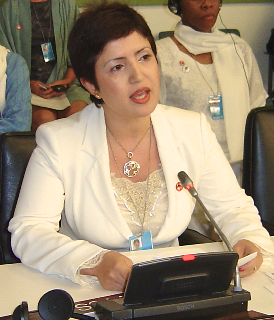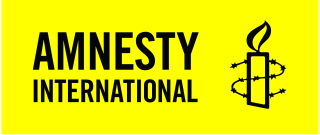Related Research Articles

Sudan's human rights record has been widely condemned. Some human rights organizations have documented a variety of abuses and atrocities carried out by the Sudanese government over the past several years under the rule of Omar al-Bashir. The 2009 Human Rights Report by the United States Department of State noted serious concerns over human rights violations by the government and militia groups. Capital punishment, including crucifixion, is used for many crimes. In September, 2019, the government of Sudan signed an agreement with the UN High Commissioner for Human Rights to open a UN Human Rights Office in Khartoum and field offices in Darfur, Blue Nile, Southern Kordofan and East Sudan. In July 2020, during the 2019–2021 Sudanese transition to democracy, Justice Minister Nasredeen Abdulbari stated that "all the laws violating the human rights in Sudan" were to be scrapped, and for this reason, Parliament passed a series of laws in early July 2020.

The International Organization for Migration (IOM) is a United Nations related organization working in the field of migration. The organization implements operational assistance programmes for migrants, including internally displaced persons, refugees, and migrant workers.

Human Rights Watch (HRW) is an international non-governmental organization, headquartered in New York City that conducts research and advocacy on human rights. The group pressures governments, policymakers, companies, and individual human rights abusers to denounce abuse and respect human rights, and often works on behalf of refugees, children, migrants, and political prisoners.

Human rights in Myanmar under its military regime have long been regarded as among the worst in the world. In 2022, Freedom House rated Myanmar’s human rights at 9 out 100.

The Human Rights Commission of Pakistan (HRCP) is an independent, democratic non-profit organisation. Founded in 1987, it is one of the oldest human rights organisations in the country.
The Polynesian Panther Party (PPP) was a revolutionary social justice movement formed to target racial inequalities carried out against indigenous Māori and Pacific Islanders in Auckland, New Zealand. Founded by a group of young Polynesians on 16 June 1971, the Panthers worked to aid in community betterment through activism and protest. Besides peaceful protests, they helped provide education, legal aid, and other social resources, such as ESOL classes and youth community programs. The group was explicitly influenced by the American Black Panther Party, particularly Huey Newton’s policy of black unity through his global call-to-action, as well as his ideology of intercommunalism. The movement galvanised widespread support during the Dawn Raids of the 1970s, and greatly helped contribute to the modern pan-Polynesian ethnic identity in New Zealand called Pasifika.

Human rights in Eritrea are viewed, as of the 2020s, by non-governmental organisations (NGOs) such as Human Rights Watch as among the worst in the world, particularly with regards to freedom of the press. Eritrea is a one-party state in which national legislative elections have been repeatedly postponed, the judiciary is weak, and constitutional provisions protecting individual freedom have yet to be fully implemented. Some Western countries, particularly the United States, accuse the government of Eritrea of arbitrary arrest and detentions and of detaining an unknown number of people without charge for their political activism. Additionally, Eritrean citizens, both men and women, are forcibly conscripted into the military with an indefinite length of service and used as forced labour.
Amnesty International Australia is a section of the Amnesty International network, and is part of the global movement promoting and defending human rights and dignity.
Amnesty International USA (AIUSA) is an American non-profit non-governmental organization that is part of the worldwide Amnesty International organization.

There were widespread reports of systematic and escalating violations of human rights in Zimbabwe under the regime of Robert Mugabe and his party, ZANU-PF, between 1980 and 2017.

Widad Akreyi is a Kurdish health expert and human rights activist. She has co-founded the human rights organization Defend International and is the author of several books about both health issues and human rights.

Amnesty International is an international non-governmental organization focused on human rights, with its headquarters in the United Kingdom. The organization says it has more than ten million members and supporters around the world. The stated mission of the organization is to campaign for "a world in which every person enjoys all of the human rights enshrined in the Universal Declaration of Human Rights and other international human rights instruments." The organization has played a notable role on human rights issues due to its frequent citation in media and by world leaders.

Salil Shetty is an Indian human rights activist who was the Secretary General of the human rights organization Amnesty International (2010–2018) till 31 July 2018. Previously, he was the director of the United Nations Millennium Campaign. Before joining the UN, he served as the Chief Executive of ActionAid. Most recently, Shetty had a short stint as the Vice President of Global Programs at the Open Society Foundations.
Human rights abuses in Jammu and Kashmir range from mass killings, enforced disappearances, torture, rape and sexual abuse to political repression and suppression of freedom of speech. The Indian Army, Central Reserve Police Force (CRPF), and Border Security Personnel (BSF) have been accused of committing severe human rights abuses against Kashmiri civilians. According to Seema Kazi, militant groups have also been held responsible for similar crimes, but the vast majority of abuses have been perpetrated by the armed forces of the Indian government.
The Human Rights Foundation of Aotearoa New Zealand is a non-governmental organisation in New Zealand, which seeks "to promote and defend human rights through research based education and advocacy."

Robert Barry Hobson Coates is a New Zealand politician who was a member of the New Zealand House of Representatives as a representative of the Green Party of Aotearoa New Zealand. Since 2019 he has been chief executive of the ethical investment charity Mindful Money.
Amnesty International Thailand (AITH), also known as Amnesty Thailand or AI Thailand, is a non-governmental organisation (NGO) focused on the protection of human rights in Thailand and worldwide with more than 1,000 members across Thailand. Amnesty Thailand is one of more than 70 "sections" that make up Amnesty International worldwide.
Amnesty International Ireland is the Irish branch of the international non-governmental organisation focused on human rights, Amnesty International.
Amnesty International India was a country unit of the Amnesty International network, and was part of a global movement promoting and defending human rights and dignity. In September 2020, Amnesty halted its operations in the country after all bank accounts of the organization were frozen by Enforcement Directorate in connection with its money laundering probe into the finances of Amnesty International and its related entities. The organization called this as 'witch hunting' while the government of India said ED case is based on a FIR filed by CBI against Amnesty for alleged violation of the Foreign Contributions Regulatory Act

Human rights in Nicaragua refer to personable, political and social rights granted to every human in Nicaragua. Nicaragua derives its understanding of human rights from the Constitution of Nicaragua and international law. Nicaragua is a member state of the United Nations which states that fundamental human rights, such as freedom from slavery and freedom of expression, are enabled for all human beings without discrimination.
References
- ↑ "Zaoui: I never lost my faith in New Zealand justice". The New Zealand Herald . 13 September 2007. Retrieved 15 September 2011.
- ↑ Baker, James (30 August 2019). "Pukekohe man first Pacific Islander take top spot at Amnesty International". Stuff.